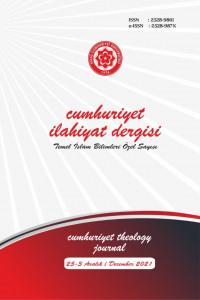Kur’an’da Ehl-i Kitab’ın Temel Bazı Yanılgıları
Some Basic Fallacies of the People of the Book in the Qurʾān
Author(s): Yunus AkçaSubject(s): Theology and Religion, Islam studies, Philosophy of Religion, Qur’anic studies
Published by: Cumhuriyet Üniversitesi İlahyat Fakültesi
Keywords: Tafsīr; People of the Book; Trinity; The Bible; Mistake;
Summary/Abstract: The phenomenon of fallacy is directly related to the nature of the person himself and the environment in which he lives. Knowing in which situations and how people are wrong will greatly prevent them from making Fallacies. For this reason, one of the most important aims of religions is to bring their followers to the happiness in this world and the hereafter, to determine the Fallacies that people may fall into beforehand and to reveal their reasons and solutions. The religions of Judaism, Christianity and Islam are basically divinely based religions based on oneness (tawḥīd). However, Judaism and Christianity have been distorted for various reasons and have come out of the creed of oneness. One of the main reasons for their distancing from this primary source is that they make Fallacies on many issues, insist on this and do not take the necessary studies for a realistic solution. Because it is not possible to eliminate the fallacy without identifying the causes and finding solutions. The human being in communication and interaction with the beings around him establishes connections with them and makes decisions by reaching some conclusions. Disturbances in these connections, which are based on previous knowledge and experience, may cause fallacies in humans. Since the Tanakh and the Bible are sacred texts with distortion dimensions, the connections established with these sources may lead people to false beliefs on some issues instead of saving them from their Fallacies. The biggest mistake of the People of the Book, which is also the source of others, is that they see themselves not as servants of Allah but as their sons, adopted sons and especially friends. This situation led them to the distortions that they are exempt from certain orders and prohibitions and that they will be treated with privilege on the day of reckoning, or only they can enter the Paradise or they will stay in Hell for a limited number of days. Unfortunately, one of the reasons that lead them to think like this is the statements about themselves in the holy books they distorted. However, the Qurʾān has clearly revealed that their belief that they will be punished for a short time in Hell is a mistake and the truth is not as they claim. One of the most important issues of the Christian faith is the belief in the Trinity, which is the subject of constant debate both in the Christian world and in the Islamic world. Christians' excessive love for Jesus led them to the mistake of seeing Jesus as a divine being sent to save people from original sin, by not assuming him a human being. These thoughts of theirs were rejected in many verses of the Qurʾān and it is emphasized that Jesus is the servant and messenger of Allah. Another important mistake of the People of the Book is claiming that they were descended from Prophet Abraham and claiming the supremacy of lineage and therefore they did not accept the invitation of the Prophet Mohammed. In our study, we have discussed some basic distortions in the light of the Qurʾān, such as thinking that they are the beloved servants of Allah, ascribing deity to other than Allah, saying that Allah is not generous and that Paradise belongs to them what the people of the Book have fallen into while distorting their religion. From this point of view, first of all, we tried to determine the factors that affect Jews and Christians to fall into distortion that is to make wrong decisions that may result in disaster both worldly and otherworldly. Next, we examined how these factors, which we determined, affect the decision-making process and voluntary behaviors of people. Finally, we tried to determine the distortions that the Qurʾān deals with and the solutions it offers to eliminate these distortions in terms of the People of the Book. Although the Qurʾān and tafsīr (exegesis of the Qurʾān) sources constitute the main axis of our study, we also benefited from the sources of science such as psychology, sociology and morality. Unfortunately, it is seen that the People of the Book do not accept the distortion despite all the evidences, they still continue to feel superiority and choice both in terms of material and lineage, which leads them to distortions, and they act according to their old beliefs and behaviors. In addition, the fact that some Muslims in the past and today are led to these distortions is an indicator of how important the issue is.
Journal: Cumhuriyet İlahiyat Dergisi
- Issue Year: 25/2021
- Issue No: 3
- Page Range: 961-982
- Page Count: 22
- Language: Turkish

